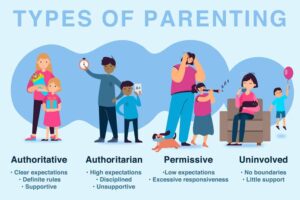 The Different Types Of Parenting Styles And Their Effects On The Child
The Different Types Of Parenting Styles And Their Effects On The Child
When it comes to parenting, there is no single “right” way. How you parent your child will depend on your individual style, your family history, and your culture. However, there are a few common parenting styles that have been linked to positive outcomes in kids.
Authoritative Parenting
Authoritative parents are warm and nurturing but firmly impose rules and enforce consequences when kids misbehave. They also make sure their children understand why something is a bad choice and how they can change their behavior. According to research, authoritative parenting is the best parenting style for most kids and families. In fact, research shows that children whose parents use this approach have the highest life satisfaction and the best social skills. In contrast, children whose parents use permissive or neglectful parenting often develop behavioral problems and self-esteem issues. They may also lack the social skills necessary to be successful in school and life. For example, when it comes to food, authoritative parents might not require a clean plate at dinner time, but they are likely to make a point of serving different foods on a consistent basis, even when their kids whine or throw tantrums. They might also make a point of letting their kids snack during the day if they’re hungry.
Authoritarian Parenting
Authoritarian parenting is the type that emphasizes a parent’s authority over their child. This style focuses on enforcing rules and consequences, rather than establishing an attachment with the child. Kids with authoritarian parents tend to have higher levels of anxiety and depression than their peers. They also have lower self-esteem and poor social skills. These parents believe that obedience to their authority is a sign of respect for the higher power and are often very strict with children. They use harsh punishments and enforce their rules with an iron fist. This parenting style takes away the child’s sense of identity and their freedom to express themselves. The child will be unable to communicate their needs, feelings, and ideas because they cannot be heard. It is also hard for children to form a strong relationship with their parents because they do not feel comfortable talking about their emotions.
Permissive Parenting
A child who has been raised by a permissive parent is more likely to develop emotional instability and poor self-regulation skills. They also have a tendency to develop conduct problems and depression as they grow older. Permissive parents often see themselves as more of a friend than a parent, so they don’t set limits or discipline their children. This can result in them feeling frustrated when they are unable to get their way and can lead to rebellious behavior. This is an important skill for kids to learn as they begin to become independent, so teaching them to set boundaries and understand the consequences of their actions is essential. If you feel like your parenting style is more permissive than you would like, there are ways to change it and make it more authoritative. A therapist can help you learn the necessary techniques for establishing clear parental authority and communicating it to your child. Practicing these techniques can make you a more effective parent and change the way your child views you.
Uninvolved Parenting
Uninvolved parenting, also called neglectful parenting, is a parent who doesn’t show any emotional involvement with their child. Often this may be unintentional but can still have negative effects on the child’s development. Children who are raised by this type of parenting will generally have difficulty forming attachments, according to research. This is because they lack the emotional support from parents that helps them form healthy relationships with others. They also have a higher chance of developing substance abuse issues, and they may not be able to control their emotions and behavior. Compared to other parenting styles, uninvolved parenting has the most negative impact on adolescent outcomes, including things like delinquency, risky behavior, and academic challenges. If you believe your child is affected by an uninvolved parenting style, it’s important to recognize the issue and take action to better their life. Therapy can be a helpful tool in this process. It will help you understand your own experience with this parenting style, and provide you with tips and guidance on how to better your child’s life.
